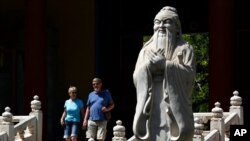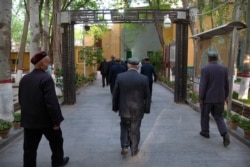The Chinese government is implementing a new decree on May 1 that will require all religious leaders to “follow the lead of and support the Communist Party.”
The decree, "Measures on the Management of Religious Professionals," states that the preaching and teaching by religious professionals must in no way endanger China’s national security, promote extremism or divide the country.
It also requires religious professionals to resist the infiltration of foreign forces through religion. Religious leaders who violate the new decree will be subject to administrative sanctions and criminal charges.
“This decree goes against our religious beliefs, and the separation of politics and religion,” said Xu Yonghai, an elder at the Divine Love Fellowship of the Beijing House Church. “There will be a further narrowing of religious freedom and more severe crackdowns on believers.”
'Sinicization' of religion
“The church should not become a social group, let alone a political group,” said Xu, whose gathering was established in 1996 with a congregation mostly composed of dissidents and rights activists from across China.
He added that the decree promotes the implementation of the policy that “persists in our nation's direction toward the Sinicization of religion."
Article 36 of the Chinese Constitution says that citizens “enjoy freedom of religious belief.” It bans discrimination based on religion and forbids state organs, public organizations or individuals from compelling citizens to believe in — or not believe in — any particular faith.
It does not ban the Sinicization of religion, which is how the CCP shapes religious practices and thoughts to reflect its goals. It has been a key element of President Xi Jinping’s government since April 2016, when he delivered a speech at the National Religious Work Conference calling for the CCP to “actively guide the adaptation of religions to socialist society.”
At the 19th Party Congress in 2017, Xi emphasized that the CCP would “provide active guidance for religion and socialism to coexist.”
The issuance of the decree coincides with a push by the government-controlled national religious associations of Protestantism, Catholicism, Taoism, Buddhism and Islam to require all believers to study topics such as the histories of the CCP, the People’s Republic of China and socialism to mark the 100th anniversary of the CCP in July.
The decree is expected to further curtail religion in China, which the U.S. Commission on International Religious Freedom (USCIRF), in its 2021 annual report issued Wednesday, a "country of special concern" for systematic, persistent and serious violations of religious freedom. The report called for the U.S. government not to send officials to attend the 2022 Beijing Winter Olympics if the Chinese government’s crackdown on religious freedom continued.
The USCIRF said the Sinicization effort particularly targets Christians, Muslims and Tibetan Buddhists because the Chinese government believes these groups maintain foreign connections. The USCIRF reported continuing use by the Chinese government of advanced technology to monitor, track and control religious minorities such as the Muslim Uyghurs.
Nury Turkel, a Uyghur-American lawyer who was appointed by House Speaker Nancy Pelosi in May 2020 to the USCIRF commission, told VOA Mandarin that the “Chinese Communist Party perceives any religion, specifically Islam and Christianity, as something disloyal to the party and also sees these religious practices, religious practitioners, as a source of potential instability. To the Communist Party, stability is a paramount concern.”
'State-controlled' practices
In the past, Turkel said that the USCIRF was concerned with China interfering with personal religious practices, “but now they're changing it, from state-managed religious practices to state-controlled or -sanctioned criminalized religious practices."
Turkel said Sinicization “has been sped up, intensified, so the Chinese government, China's Communist Party, [is] spreading their own ideology, try[ing] to replace it as a religion over the other traditional religious practices that the Chinese citizens have been practicing for centuries if not for thousands of years."
Fenggang Yang, a sociology professor at Purdue University who oversees the Center on Religion and the Global East, said that China's religious policy has changed significantly in the last two or three years to further limit the freedom of religious professionals.
“In principle, the Chinese Communist Party adheres to Marxism-Leninism, which includes atheism,” Yang told VOA Mandarin. “There are logical problems when the Chinese authorities require religious professionals to embrace the Communist Party and atheism for their leadership or domination.”
Yang said that any religion introduced to a new country would adapt to the local sociopolitical system and culture, but in China people must beware of religion being manipulated by the CCP as a tool to further its own ends.
Xu, who has been tried, detained and denied his state pension because of his faith, said religious professionals and believers were “not afraid of crackdowns. … We will still be able to serve the Lord, and we're very confident about that."
Adrianna Zhang and Mo Yu contributed to this report.












